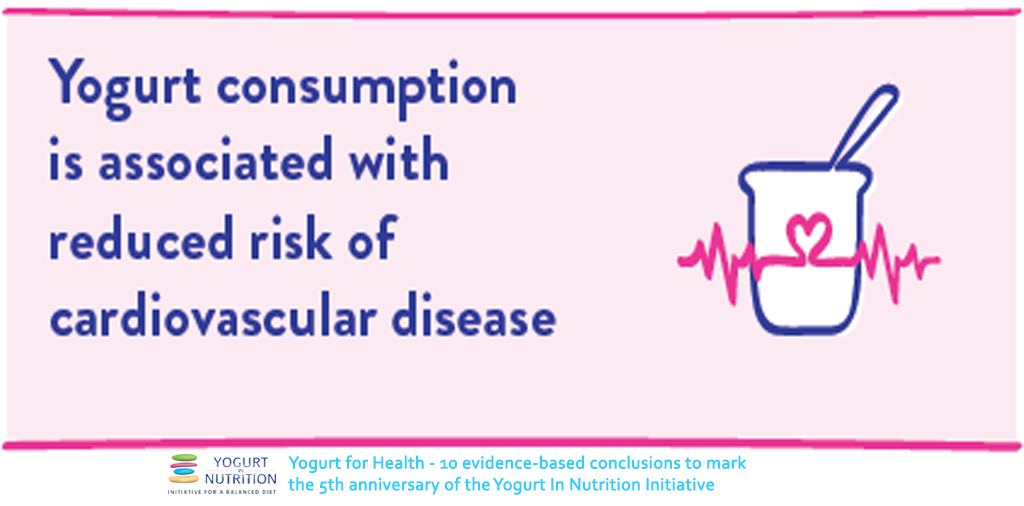“Yogurt consumption is associated with reduced risk of cardiovascular disease (CVD)” is one of the 10 evidence-based conclusions made by the YINI board about the health effects of yogurt… learn more below
The association between yogurt consumption and reduced risk of CVD may be due to the protective properties of some components.
- Yogurt and other dairy products are rich in micronutrients and proteins, some of which have been shown to lower blood pressure.
- Low-grade inflammation underlies the pathology of CVD, and some saturated fatty acids found in antiinflammatory effects.
- Calcium, potassium and magnesium found in yogurt have been linked to a reduced risk of stroke.
- Milk proteins may have a beneficial effect on blood lipids.
- The dairy matrix may contribute to the beneficial effects of yogurt and other dairy products and determine the fat bioavailability.
In addition, cheese and fermented milk products such as probiotic yogurts and semi-skimmed yogurts in particular have a high antioxidant potential i.e. the ability to combat oxidative damage, and could play a part in healthy and active ageing.
Whole-fat or low-fat dairy products?
Although nutritional guidelines recommend consumption of low-fat rather than whole-fat dairy foods to reduce CVD, recent findings suggest that this advice may need to be modified.
A review of meta-analyses has found that the consumption of various forms of dairy products – including total dairy, cheese, yogurt, high-fat and low-fat dairy – shows either favourable or neutral associations with cardiovascular-related outcomes.
Researchers conclude that the current scientific evidence calls into question the negative image of milk fat, and that consumers can continue to consume full-fat dairy products moderately as part of a healthy and balanced lifestyle, with fermented dairy products being preferable for optimum nutrient intake and potential cardiovascular health benefits
References:
- Givens DI. Saturated fats, dairy foods and health: a curious paradox? Nutrition Bulletin 2017;42:274–82.
- Guo J, Astrup A, Lovegrove JA, et al. Milk and dairy consumption and risk of cardiovascular diseases and all-cause mortality: dose-response meta-analysis of prospective cohort studies. Eur J Epidemiol 2017;32:269–87.
- Lordan R, Tsoupras A, Mitra B, et al. Dairy fats and cardiovascular disease: do we really need to be concerned? Foods 2018;7:29.
- Fardet A, Rock E. In vitro and in vivo antioxidant potential of milks, yoghurts, fermented milks and cheeses: a narrative review of evidence. Nutr Res Rev 2017; Oct 2:1–19.
- Astrup A. Yogurt and dairy product consumption to prevent cardiometabolic diseases: epidemiologic and experimental studies. Am J Clin Nutr 2014;99(5 Suppl):1235S–42S.



